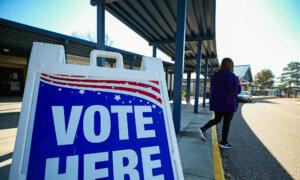Louisiana officials say the court needs to act by May 15 to keep planning for this year’s elections on track.
Black voters and liberal groups asked the Supreme Court on May 8 to intervene in the racially tinged fight over the congressional map in Republican-dominated Louisiana.
The decision the court makes could have nationwide ramifications given Republicans’ razor-thin majority in the U.S. House of Representatives. Louisiana is home to Speaker Mike Johnson and House Majority Leader Steve Scalise, both Republicans.
The dispute is about an electoral map approved by the Republican-dominated Louisiana State Legislature that created a second majority-black district among the Pelican State’s six U.S. House of Representatives districts. Five of those six seats are held by Republicans. Republicans hold both U.S. Senate seats.
A lower court last week ruled against the map, which the groups say has left “Louisiana without a congressional map just months away from the 2024 elections.”
The groups say black voters “have already been compelled” to vote on a map that lower courts determined violated the law and point to a separate U.S Court of Appeals for the Fifth Circuit ruling that found that a congressional map that featured only one majority-black district probably violated Section 2 of the federal Voting Rights Act. Section 2 prohibits voting procedures that discriminate on the basis of race, color, or membership in a large language minority group. That map was used in the 2022 elections.
The nation’s highest court needs to weigh in and halt the lower court’s ruling against the map “to ensure that harm is not repeated,” the groups stated in the new application.
The Supreme Court could permit the most recently drafted congressional map to be used in the elections in November, or it could refuse the emergency appeal. Denying the application would place the burden on the state Legislature or lower courts to draft a new map.
Louisiana officials say they need a decision by May 15 in order to prepare for the November elections.
The original lawsuit was initiated by a bloc of voters who identified themselves as “non-African American” and who alleged that Louisiana violated the U.S. Constitution’s Equal Protection Clause when the Legislature approved a second majority-black congressional district that discriminated against them. The map the Legislature approved after the 2020 census provided for one majority-black district even though black Americans make up almost a third of Louisiana’s population.
Alabama had asked the Supreme Court to weaken Section 2, arguing the U.S. Constitution required such remedial action, but the court held in Allen v. Milligan that the map drafted by Alabama Republicans violated the anti-racial gerrymandering provisions of the federal law.
Alabama had defended its redrawn electoral map, arguing that the law did not require the state to redraw districts to ensure black representation in the state’s congressional delegation.
Alabama’s position “runs headlong” into the Supreme Court’s precedent, Chief Justice John Roberts wrote for the majority.
“A district is not equally open, in other words, when minority voters face—unlike their majority peers—bloc voting along racial lines, arising against the backdrop of substantial racial discrimination within the State, that renders a minority vote unequal to a vote by a nonminority voter,” he wrote.
Justice Clarence Thomas filed a dissenting opinion, which was joined by Justices Neil Gorsuch, Amy Coney Barrett, and Samuel Alito.
“The question presented is whether [Section] 2 of the Act, as amended, requires the State of Alabama to intentionally redraw its longstanding congressional districts so that black voters can control a number of seats roughly proportional to the black share of the State’s population,” Justice Thomas wrote.
“Section 2 demands no such thing, and, if it did, the Constitution would not permit it.”
Meanwhile, the Supreme Court is currently deliberating another equal protection challenge to the electoral map in South Carolina.
Republican state lawmakers told the Supreme Court it should overturn a ruling that the South Carolina Legislature racially gerrymandered a congressional district because lawmakers used political, not racial, data to justify the redrawn map.
The Supreme Court frowns on racial gerrymanders, treating them as constitutionally suspect, but has adopted a hands-off attitude toward partisan gerrymanders.
The congressional seat at issue is currently held by Rep. Nancy Mace (R-S.C.). Republicans outnumber Democrats in the state’s delegation to the U.S. House six to one. Ms. Mace’s district covers the Atlantic shoreline, including Charleston and Hilton Head. Both of the state’s U.S. senators are Republicans.
A decision in the case is expected by the end of June.
Original News Source Link – Epoch Times
Running For Office? Conservative Campaign Consulting – Election Day Strategies!


